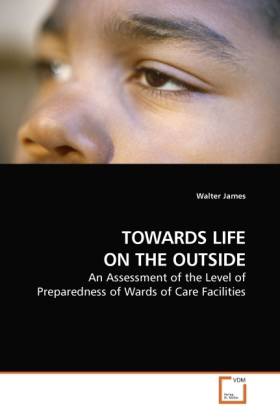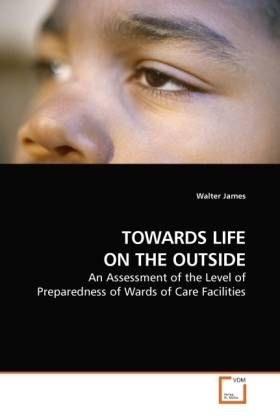
Bedankt voor het vertrouwen het afgelopen jaar! Om jou te bedanken bieden we GRATIS verzending (in België) aan op alles gedurende de hele maand januari.
- Afhalen na 1 uur in een winkel met voorraad
- In januari gratis thuislevering in België
- Ruim aanbod met 7 miljoen producten
Bedankt voor het vertrouwen het afgelopen jaar! Om jou te bedanken bieden we GRATIS verzending (in België) aan op alles gedurende de hele maand januari.
- Afhalen na 1 uur in een winkel met voorraad
- In januari gratis thuislevering in België
- Ruim aanbod met 7 miljoen producten
Zoeken
Towards Life on the Outside
An Assessment of the Level of Preparedness of Wards of Care Facilities
Walter James
Paperback | Engels
€ 71,95
+ 143 punten
Omschrijving
"Little or no difference has been found in terms or the success of institutionalization as compared to non institutionalization. The many adverse influences on an individual that seem unavoidable within any institutional setting evidently cannot be outbalanced by treatment efforts. This is especially the case for juveniles, who are vulnerable to negative influences". Each year, graduates of caring institutions must leave at age 18 years to enter the world as independent young adults. The above grim comment was made in the United Nations' Standard Minimum Rules for the Administration of Juvenile Justice (1985) [Commentary on Rule 19.1.]. The comment points to the apparent failure of care facilities for children internationally to appropriately rehabilitate juveniles under their care. In Jamaica there is little data to indicate the extent of their integration and their ability to cope individually with the economic and social demands of life on the outside. This study examined their preparation for life on the outside and how those who are out are actually coping and integrating with society.
Specificaties
Betrokkenen
- Auteur(s):
- Uitgeverij:
Inhoud
- Aantal bladzijden:
- 84
- Taal:
- Engels
Eigenschappen
- Productcode (EAN):
- 9783639224672
- Verschijningsdatum:
- 25/01/2010
- Uitvoering:
- Paperback
- Formaat:
- Trade paperback (VS)
- Afmetingen:
- 152 mm x 229 mm
- Gewicht:
- 136 g

Alleen bij Standaard Boekhandel
+ 143 punten op je klantenkaart van Standaard Boekhandel
Beoordelingen
We publiceren alleen reviews die voldoen aan de voorwaarden voor reviews. Bekijk onze voorwaarden voor reviews.









